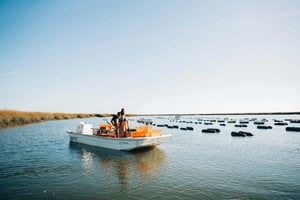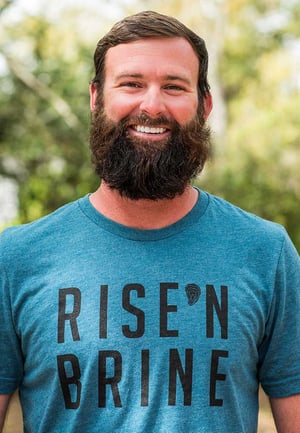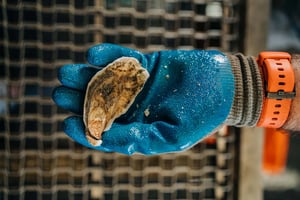
LOW COUNTRY
OYSTER CO.
Starting Something New
If you have ever enjoyed a LowCountry Oyster it’s thanks to Trey McMillan’s leap of faith. A professional fisherman-turned-oyster farmer, Trey and his team pioneered floating cage oyster aquaculture in the silty waters of Charleston, SC. But the road to success was long. By the time he finally became operational in 2017, Trey had spent 4 years navigating the complex and expensive permitting process. “It was painful,” he recalls, “almost to the point of giving up many times. I’m so glad I didn’t.”
Today, LowCountry is growing 10 million oyster seeds and runs its own distribution from a warehouse in town. With a processing house and retail fish market under construction, Trey isn’t slowing down. “Our business is growing faster than I ever imagined. It’s so much work, and so much fun.”

“Our business is growing faster than I ever imagined.
It’s so much work, and so much fun.”
We were the coordinators getting [the agencies] to talk, closing the gaps ourselves. We had to help them see the many ways our oyster farm gives back to the community.
Going from the farm to the distributor, there was a big gap in productivity. We had nothing that helped us with all that paperwork in order to stay compliant with state and fed regs—no tool, no system, nothing.
Trey McMillan, CEO
Two Big Disconnects with Similar Issues to Solve
1. Gap Between Agencies
Gaining a permit was the first hurdle. State agencies doubted that Trey’s idea would be any different than past aquaculture operations that had left equipment rusting in the water. Trey struggled to convince them otherwise until he reframed his pitch to solve each group’s incentives. Once the State recognized the revenue potential; the OCRM saw the role of oysters’ filtration for the ecosystem; and the Army Corps understood the impact on poor rural coastal counties, Trey finally secured his permit.2. Gap Between Players
With operations underway, Trey soon found the communication between his farmers and distributors similarly inefficient. At the start, he used a huge whiteboard to log the oyster crates, erasing and updating all data each month. As production grew, his farmers would make more frequent trips from the bay to the board and back to keep track of their seeds, on-hand inventory, and harvested bags. When LowCountry expanded into distribution, the team had to reprint labels to log the “change of hands” from farm to warehouse. Paperwork piles rose, errors increased, and productivity decreased. Trey needed a solution to smooth his operations and ensure regulatory compliance of his logs. He called Chip, curious about BlueTraceDigitize Logs & Simplify Management with BlueTrace
TAG & LABEL EVERYTHING ONCE
With 2 printers at the farm and 2 more at the warehouse, Trey’s operation now flies. Using the mobile app, his farmers enter harvest data and print bulk tags per lot, all from their boats. On land, the warehouse team pulls and re-tags with customer and shipping data, printing labels as they go.
The best part? Trey doesn’t have to do his books manually anymore. BlueTrace saves all records digitally. The log data, kept private and protected, is available to share with regulators or inspectors in seconds, letting Trey focus on the farm.
TRACK INVENTORY IN REAL-TIME
BlueTrace’s live inventory enables Trey to communicate between his boats, offices, trucks, and warehouses. Now, everyone knows exactly how much product is available to harvest, pack, and fill orders throughout a day.
For example, when his warehouse team receives a lot of a given item and logs it in the BlueTrace app, Trey sees the immediate uptick in item inventory. When orders are shipped using items from that lot, inventory decreases as the driver scans the labels. The visibility is instantaneous.
He didn’t need to change the tasks, just the tools.
Trey needed a solution to replace his whiteboard, improve communication, and reduce redundant paperwork. He tried to track logs using spreadsheets, but his team was intimidated by an ad-hoc solution they didn’t understand.
“I swear, we’re the least educated bunch doing aqua- culture in the US. My farm manager was a pressure washer; my production manager was a chef; no one has a degree in this stuff, and we don’t need one. Just calloused hands, strong backs, grit, and trust.”
He didn’t need to change the tasks, just the tools.

Growing Faster Than Imagined
“I get calls asking us for records of what price exactly we’ve sold every product in a year, to which clients, when, etc. The amount of information I used to store on paper—or honestly by memory—is astounding.
BlueTrace has integrated that all into one simple system, one that was designed for businesses like ours and can be updated as we use it. When I have to get 50 thousand oysters out of the water, I can’t wait for slow service. BlueTrace is a partner I trust to get the job done.”
As of July 2024, LowCountry Oysters has printed 73,000+ tags using BlueTrace Print & Log app, and is currently onboarding the new BlueTrace Inventory Management software system, launched this summer. Among many things, this platform will show Trey which products are most profitable, and will integrate with his accounting system to simplify the purchasing and invoicing processes. As business continues to scale, Trey is equipped and ready.
The BlueTrace Difference
I’d stick with BlueTrace for the data reporting, alone. It’s all stored in a cloud database system, and that’s significant. BlueTrace built their product by listening to customers’ processes. It’s not hard to use a tool designed to fit your business.” - Trey McMillan
